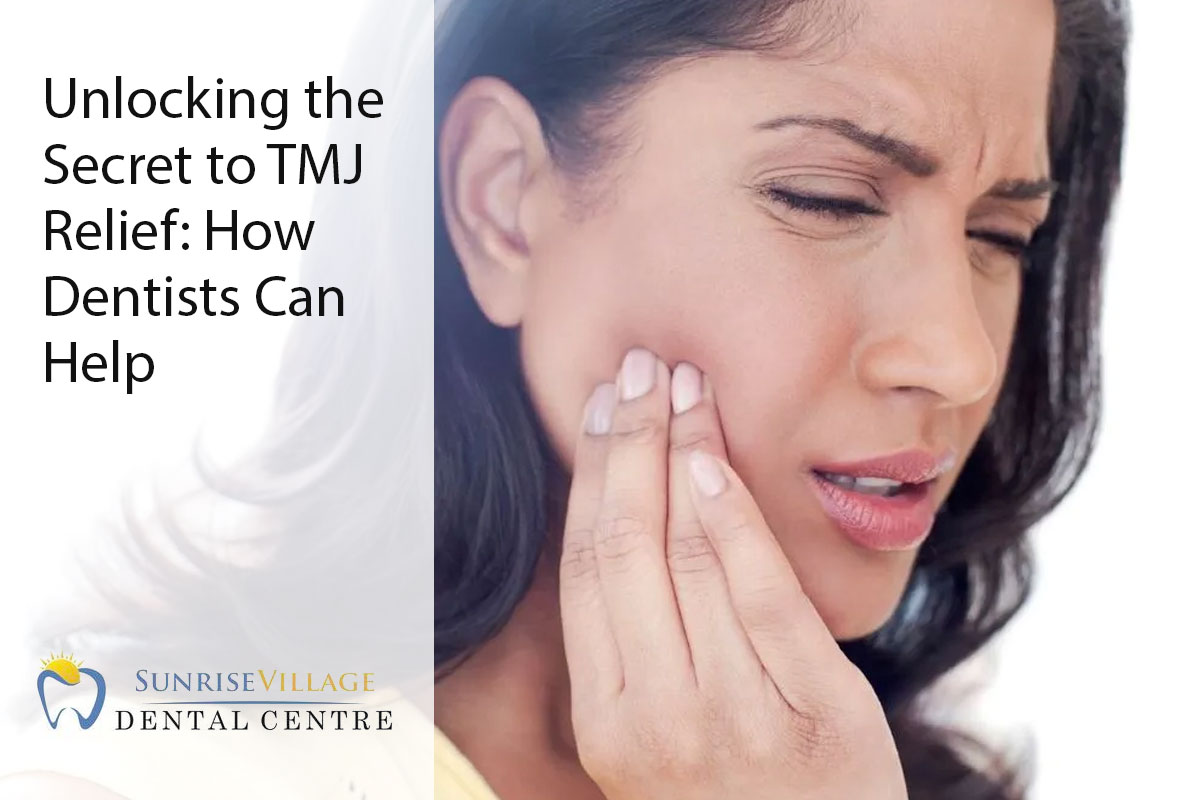
Feeling jaw pain, headaches, or trouble chewing often? You might have TMJ disorder, a common problem. No worries, help is available! Learn about how dentists can help ease TMJ symptoms.
What is TMJ?
Common symptoms of TMJ disorder
TMJ disorder can exhibit in diverse ways, and symptoms can vary from individual to individual. However, some commonly observed manifestations include:
- Jaw discomfort or soreness: Ranging from a dull ache to sharp pain, it may be felt on one or both sides of the face.
- Headaches: TMJ-related headaches often occur around the temples or behind the eyes and can be incapacitating.
- Difficulty chewing or eating discomfort: Those with TMJ disorder might encounter pain or unease while chewing, impacting their ability to enjoy meals.
- Clicking or popping sounds in the jaw: A noticeable clicking or popping noise during mouth movement, possibly accompanied by a sensation of the jaw becoming stuck.
- Ear pain or ringing: TMJ disorder may induce pain around the ears and a ringing or buzzing sensation (tinnitus).
- Facial pain: Discomfort that can spread to the face, causing sensations in the cheeks, temples, or jawline.
- Neck and shoulder pain: TMJ-related pain may extend to the neck and shoulders, resulting in muscle tension and discomfort.
Causes of TMJ disorder
TMJ disorder can stem from a variety of factors, including:
- Teeth grinding or clenching (bruxism): This habitual action places excessive strain on the jaw joint, causing inflammation and pain.
- Jaw misalignment: Incorrect alignment of the jaws can create stress on the TMJ and the surrounding muscles.
- Trauma or injury: A forceful impact to the face or jaw can result in TMJ damage, leading to persistent pain and dysfunction.
- Arthritis: Certain types of arthritis, such as rheumatoid arthritis or osteoarthritis, have the potential to affect the TMJ.
- Stress: Prolonged stress can induce muscle tension in the jaw, contributing to symptoms associated with TMJ disorder.
How dentists can diagnose TMJ disorder
Dentists are skilled at identifying TMJ disorders by understanding the intricate anatomy of the jaw joint. They can thoroughly evaluate and determine the cause of your symptoms. During your appointment, the dentist will:
- Review your medical history: Understanding your medical background helps reveal any factors contributing to your TMJ disorder.
- Perform a physical exam: The dentist examines your jaw joint, muscles, and bite for any abnormalities or signs of inflammation.
- Use diagnostic imaging: X-rays, CT scans, or MRI scans provide a detailed view of the jaw joint, uncovering any damage or misalignment.
- Analyze your bite: Advanced technology helps assess how your teeth and jaws come together during different activities, aiding in understanding your bite and jaw movements.
By combining these diagnostic approaches and their expertise, dentists can accurately diagnose TMJ disorder and create an effective treatment plan.
Treatment options for TMJ relief
The good news is that there are several ways to ease TMJ symptoms and bring back normal jaw function. The treatment chosen depends on how severe your condition is and what’s causing it. Here are some common options:
- Occlusal splints: Custom-made bite guards or night guards ease pressure on the TMJ, preventing teeth grinding or clenching.
- Orthodontic interventions: Braces or clear aligners may be recommended to fix misalignment contributing to TMJ disorder and relieve symptoms.
- Physical therapy: Jaw exercises, stretches, and physical therapy techniques can enhance jaw movement, reduce muscle tension, and ease TMJ-related pain.
- Medications: Over-the-counter pain relievers, muscle relaxants, and anti-inflammatory drugs might be prescribed to manage pain and decrease inflammation.
- Lifestyle changes: Dentists may suggest stress management techniques, relaxation exercises, or dietary adjustments to minimize TMJ-related symptoms.
- Dental restorations: Crowns or dental bridges may be needed in some cases to correct bite issues and restore proper jaw alignment.
It’s crucial to understand that everyone is different, and what works for one person may not work for another. A dentist experienced in TMJ treatment will closely work with you to find the most suitable options for your specific needs.
TMJ prevention tips
Although completely preventing TMJ disorder can be challenging, there are steps you can take to lower the risk of developing it or making existing symptoms worse. Here are some tips:
- Maintain good oral hygiene: Take care of your teeth and gums to prevent gum disease and tooth decay, which can contribute to TMJ disorder.
- Avoid unnecessary jaw movements: Steer clear of habits like chewing gum or biting your nails, as they can strain the jaw joint and muscles.
- Manage stress: Find healthy ways to cope with stress, as chronic stress can lead to muscle tension and jaw clenching. Consider activities like exercise, relaxation techniques, or counseling.
- Protect your jaw during physical activities: If you’re involved in contact sports or activities with a risk of facial trauma, wear a mouthguard to safeguard your teeth and jaw joint.
- Maintain good posture: Proper posture can reduce strain on the jaw joint. Sit up straight, avoid slouching, and position your computer monitor at eye level to promote good posture.
- Limit excessive chewing: Cut back on hard or chewy foods that can put too much stress on the jaw joint.
- Take breaks during repetitive activities: If your work or hobbies involve repeated jaw movements, make sure to take regular breaks to give your jaw muscles a rest.
Conclusion
TMJ disorder can impact your daily life with pain and discomfort, but relief is available through an experienced dentist. Dentists can diagnose and provide personalized treatments, from non-invasive therapies to surgeries. Following your dentist’s guidance helps overcome TMJ symptoms and restore normal jaw function, ensuring a pain-free and comfortable life. Trust your dentist for expert care, freeing yourself from TMJ’s grip and enjoying a renewed sense of well-being. To schedule an appointment, contact Sunrise Village Dental at (604) 253-2433.
